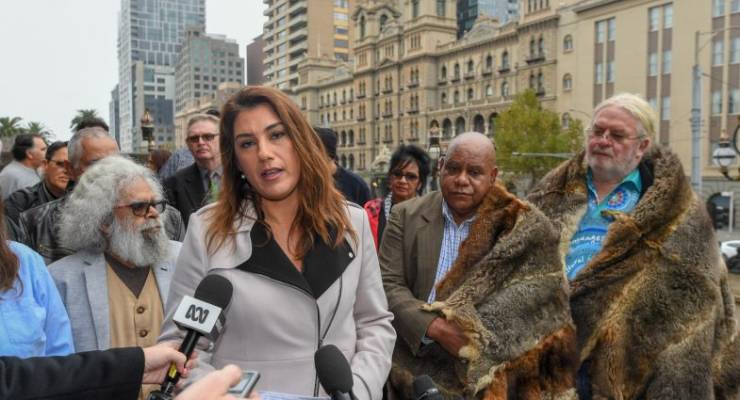
Victoria’s treaty process holds genuine potential to reconfigure Aboriginal-state relations, but Daniel Andrews’ commitment to justice and empowerment for Aboriginal peoples must be evaluated by his government’s actions, not its good faith rhetoric.
A key tenant of genuine negotiations between parties which hold different amounts of power is that talks are entered under good faith; the disadvantaged side must trust that the stronger will not abuse its power and act to detriment the weaker party while negotiations are ongoing. Given the intergenerational trauma of colonisation and the ongoing disadvantage and exclusion of Aboriginal communities, faith in governments and promises of justice may be understandably low.
Labor’s approach to good faith is easily questioned, despite repeated assertions by the party’s minster for Aboriginal Affairs, Natalie Hutchins that it is a key principle of the treaty process.
Lidia Thorpe and the Greens held the Andrews government to account by highlighting the ironies and discrepancies between the words and actions of Labor ministers throughout the treaty process and parliamentary debate.
As the first Aboriginal woman to sit in Victorian parliament and from a family of influential grassroots matriarchs and activists, Thorpe is in a unique position to comment upon and influence the treaty legislation. While the Greens argued with the government over many points relating to forming an Aboriginal Representative Body, the state’s position on recognising Aboriginal sovereignty was revealing.
While it’s a complex and personal issue, sovereignty lies at the core of treaties as it recognises the power and authority of parties. The government claimed that legally it could not actively recognise that Aboriginal peoples have never ceded their sovereignty, despite the Northern Territory government doing so in the Barunga Agreement. For Thorpe and the Greens, the refusal to recognise sovereignty undermines the treaty process structurally, but Labor’s inaction in other areas further limit’s the state’s claim of good faith.
Throughout the treaty debate and NAIDOC week, Aboriginal women have been camping out, physically defending a series of culturally sacred trees which VicRoads intends to destroy as they extend a highway near Ararat. The Djab Wurrung Heritage Protection Embassy claims that the government’s approval was based on flawed consultation and were quick the highlight the hypocrisy of the government’s claim of good faith with the campaign hashtag #NoTreesNoTreaty. If the tree protectors are arrested and the sacred sites are destroyed it will be hard to believe Labor’s claim of a genuine and respectful partnership with Aboriginal people, and the Greens are mobilising to hold the government to account at the upcoming state election.
Political pressure is mounting on Planning Minister Richard Wynne, and it is very possible he will lose his marginal inner-city seat due to his involvement in approving the highway route. Seemingly unphased at the prospect of losing both a key factional ally and public trust in his treaty process, Daniel Andrews has been silent on the issue beyond claiming that traditional owners had approved of the project, despite the local Eastern Maar Aboriginal Corporation last month denying they supported it.
Andrews has the power to intervene and as long as his government chooses silence and inaction, both the sacred trees and any claims of good faith remain under threat.
Speaking to a crowd of thousands of Aboriginal people and their supporters at the recent Melbourne NAIDOC march, Lidia Thorpe drew attention to Andrews’ duplicity on the Djab Wurrung women’s sacred trees and his commitment to celebrating Australia Day while many Indigenous people protest and mourn. While saving the trees from bulldozers has a heightened urgency, Thorpe and others also drew attention to the Victorian Government’s policies which adversely and disproportionally impact Aboriginal women.
Aboriginal and Torres Strait Islander women are staggeringly over-incarcerated. Thousands of Victorian Aboriginal children are taken from their mothers and placed into out of home care or enter the youth justice system. Andrews’ new mega youth prison at Cherry Creek will disproportionally lock up and systematise Aboriginal kids.
In 2016, moves by the state government to hand back properties to Aboriginal Housing Victoria were a rare example of demonstrated good faith, and similar gestures need to be repeated throughout the treaty process. The government of British Colombia, Canada, have been incrementally negotiating modern treaties with First Nations for years. The province worked out that good faith is crucial to maintaining momentum and trust throughout the years-long negotiations. Canada demonstrated its intent and commitment to Aboriginal people with pre-treaty interim arrangements which promote cooperative relations, in areas such as management of waterways and parks, economic development, or heritage management. Daniel Andrews should take note.
Thorpe and the Greens have been labelled by detractors on all sides of politics as obstructionist and idealistic, but ultimately the treaty bill would not have passed without their support. Andrews should be proud that his government passed the nation’s first treaty legislation, but this process has just begun, and the government should be under no illusion that this will be concluded by the next election. As the treaty process enters a new phase, Andrews must be aware of and accountable for his action and inaction on issues important to the Aboriginal community, and to build trust he must ensure that his policies match his aspiration of good faith negotiations.
Massimo Amerena is a settler living on Kulin land in Melbourne. He is a Master of Arts candidate at Victoria University, researching the Victorian Treaty process.







The sad fact is that VicRoads have both done a very poor job in designing the Western Highway to Ararat and have failed to fess up to their ineptitude. The Andrews Govt should recognise the problem, review and redirect the route of the road and avoid totally unnecessary confrontation over the issue.